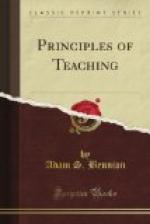The Significance of Individual Differences in Teaching
“Individual instruction in our religious organizations as in the public schools is under present condition impracticable. We are compelled to teach in groups or classes of somewhat varying size. Consequently, it is of prime importance for the teacher, in trying to apply that fundamental principle of pedagogy—an understanding of the being to be taught—to know first what characteristics and tendencies, whether native or acquired, are known to a large majority of the children in the class. Leaving out of consideration the possible presence of subnormal children, the language used must be clear and simple enough to be comprehended by all; the great majority of the questions must be intended for all to find answers to; the stories, illustrations, incidents, pictures, and various devices employed must be reasonably within the range of experience and comprehension of all members.
“At the same time, it is important to recognize the fact that, after all, the class as a whole does not in any very fundamental, pedagogical sense constitute the objective unit of instruction. Though it seems natural for most teachers to look upon the class as a more or less uniform mass, and the exigencies of the situation make this to some extent unavoidable, still the individual child remains always the real unit, and furthermore the units are all different—in appearance, training and temperament.
“In general the methods and material will be uniform for all, but there will still be abundant opportunity for exercising little individual touches and tricks in relation to individual pupils, especially those who vary somewhat widely from the average. Even such a superficial matter as size, especially superior size, might profitably receive a little special consideration by the teacher and thus at times save some pupil a little physical embarrassment. The boy unusually active might be given some physical task to perform, even if it has to be provided for the occasion, though it must not be too artificially created, as this is sure of detection.
“Questions requiring more than ordinary mental ability to answer may be directed to those of superior alertness and intelligence, who may also be given more difficult subjects to look up for presentation to the class. Special interests in animals, flowers, books, aeroplanes, industries, vocations, should be discovered and utilized by the watchful teacher. Even though the connection may be a little remote, any contribution of real interest and value is legitimate in order to relieve the monotony of a dull class.
“Pupils differ very widely in temperament and disposition as well as in capacity. The timid boy or girl should be given special encouragement and commendation, while the over-bold will take no injury from a mild “squelch” occasionally.




